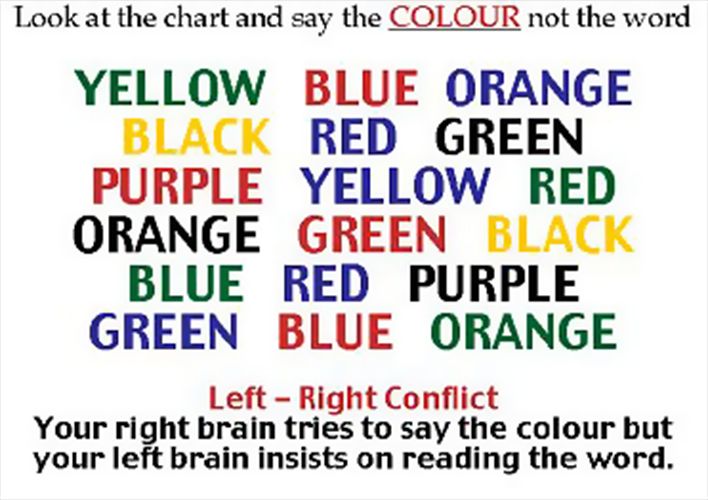Cognitive Dissonance Made Easy
- Details
- Written by AndEl

I’ve read around many sources concerning one classic psychological phenomenon: Cognitive Dissonance. However, it seemed that every site I read from was trying to numb my mind with advanced terminology. It almost seemed they’d reached for a thesaurus and changed every word I read, so that “Hello, my name is John” becomes “Greetings, one may accost me by the appellation comprehended as John.”
No thanks!
If, like me, you prefer things to be kept simple – then this is the perfect post for you. Cognitive Dissonance is a difficult concept to understand, and I can’t exactly explain it without using at least some important terms. So I’ll try to keep things as simple as can be – whilst keeping the post academic also. I hope this helps! Enjoy!
So what is Cognitive Dissonance?
Cognitive Dissonance (or disharmony) is a state of conflict in the mind, whereby you have two opposing views at the same time. The theory suggests that the mind naturally wants to eliminate dissonance where possible. How can it do this? By changing the way you feel about or perceive certain things (changing your attitudes and beliefs). Cognitive Dissonance is normally strongest when we think about ourselves in a certain way, then do something to oppose that belief. For example, if Simon thinks he is an animal lover, and then kicks a cat in the street for getting in his way, there will be a huge level of tension in his mind. To reduce this, the mind will change his beliefs and attitude, or blame, deny or justify:
- “The cat deserved it for running in front of a larger animal (me).”
- “The cat must be stupid anyway for running into me.”
- “Cats are my least favourite animal anyway.”
- “The cat might have caused me further trouble if I hadn’t scared it off”
- “The cat walked into my foot; I didn’t kick it!”
Although Simon might have originally disagreed with these statements, his mind justifies his actions to reduce dissonance. Take a look at this clever comic strip which shows an example of Cognitive Dissonance (in a more humorous light!):

As you can see, Cognitive Dissonance is extremely powerful. Nobody wants to feel conflict with themselves, so they’ll justify everything to reduce the dissonance.
Here are some more everyday examples to help:
- Kate slaved her entire two years at college to get good grades, and to her delight, she got five A’s! She applied for the top five Universities in the country, and eventually decided to go to Oxford. When she got there, she found the University was actually pretty average*, and wasn’t exactly as great as she expected. To solve the dissonance between the huge effort to go there, and the reality that the University is pretty average, she convinces herself that Oxford is the most fantastic place ever.
- Fred works in an office. After work, he decides to steal a few office supplies. Even though he knows it’s wrong, and he could get in trouble, he decides he deserves them for the ‘hard work’ he’s been putting in recently. The company doesn’t pay him enough anyway, it’s just a little extra on the side… right?
- Mamma Smith is having a nice mooch in Sainsbury’s, when she sees a bunch of grapes. She samples one. Even though this is actually stealing, and she knows it’s wrong, she was just making sure they were tasty – wouldn’t it be a waste of money if they were sour or nasty!
- At work, James isn’t monitored very often. Every time he takes his one hour break, he actually goes for an hour and a half. Rather than believe he’s stealing (getting paid for time he isn’t working), he justifies it by saying he’s overworked and deserves the extra time off.
- Sarah just bought a new car. Admittedly, she spent much more money than she should have and feels regretful and actually a little embarrassed as well (buyer’s remorse). Rather than continue feeling these undesirable emotions, she decides that the car is less likely to break down than her older one, and will actually save her loads of cash in the long run. Besides, the car is much more attractive so people will like her more – maybe she’ll even make them jealous!
- Gilbert is a healthy body builder. In one day, he ends up eating a fast food meal for lunch, then a take away on the night. He knows he’s healthy, but the unhealthy behaviour causes dissonance. He decides that he’ll just burn off the extra calories anyway, as he exercises for an hour every day. Anyway, he had a small breakfast so needs to ‘make up for it’.
- Laura really values a man with a good sense of humour. When she first met her boyfriend Adam, he seemed funny – but actually he’s really boring. Rather than feel dissonance, she decides to leave him for a funnier man.
*I’d like to reiterate that I think Oxford is great, and I wish I had the brains to go there myself! It was just the best example because people who go to Oxford will have very high expectations; the Cognitive Dissonance in this situation will be very strong.

Reducing Dissonance.
There are three ways to reduce dissonance, as defined by Festinger (1956):
- Altering the importance/value of of the conflicting belief.
- Emphasise a new belief that supports your behaviour.
- Changing your behaviour all together.
Let’s use the final bullet point to explain all three (Laura and her ‘boring’ boyfriend):
Belief: I do not value boring men; I only like men with a good sense of humour.
Behaviour: Dating a boring man with no sense of humour.
So what can she do? She can use any of the three ways of reducing dissonance as mentioned above. Here are the outcomes, in the order they are above:
- Alter the importance/value of the belief: “It doesn’t matter if he’s boring, to be honest.”; “He might be boring but good looks are more important”.
- Emphasise a new belief that supports her new behaviour: “If he spends time with me, he might gain a sense of humour”, “My friends will love him because he’s good looking – they’ll never notice that he’s a little boring”.
- Change the behaviour all together: “I’m no longer going to date him”; “I will date a funnier man”.
Let’s use another example – bullet point 2 (Fred who steals office supplies):
Belief: Stealing is illegal and immoral, and I’m an honest person.
Behaviour: Stealing office supplies.
- Alter the importance/value of the belief: “Stealing isn’t really that bad”.
- Emphasise a new belief that supports her new behaviour: “Everyone else does it, I’m not the only one”; “I deserve a little more for my hard work”; “These particular supplies are never used anyway, so they’ll go to waste if I leave them here!”
- Change the behaviour all together: “I will not steal these supplies.”
See if you can come up with ways to reduce dissonance for the other examples!
***
So there you have it: the fundamentals of Cognitive Dissonance. Hopefully I made it easy to understand, with help from examples! If you’re up for reading other articles, then I’d advise these websites:
http://www.beyondintractability.org/essay/cognitive_dissonance/
http://en.wikipedia.org/wiki/Cognitive_dissonance
http://changingminds.org/explanations/theories/cognitive_dissonance.htm
And another Psychology blog explains a classic study by Festinger (who first described Cognitive Dissonance), which I will no doubt blog about sooner or later:
http://www.spring.org.uk/2007/10/how-and-why-we-lie-to-ourselves.php
Again, I hope this has come in use, and I’ll see you soon
Credit: psychohawks.wordpress.com
© 2016-2022 crystalwind.ca. All rights reserved.
Liked this article? Dive deeper into personal growth and wellness! Check out CrystalWind.ca for spiritual wisdom or explore AromaWorx.ca for natural well-being tips. Spread the positivity—share this with friends on their happiness journey!
Let’s Chat! Drop Your Thoughts Below! ![]()
Related Articles - Journey
Latest Articles
Dive into the Mystical World of the Crystal Wind Oracle Deck!
Get All the Enchanting Details Now!
NEW Expanded Boxed Edition!
Now with 58 Cards for Richer Wisdom!

Imagine a world of inspiration and healing, free for all—made possible by YOU!
Donate Now—Ignite the Magic at CrystalWind.ca!

Epilepsy - Finding A Cure
Your donation can make a difference!
Help us find a cure – donate now!
Unlock Your Light: Join Lightworkers Worldwide on CrystalWind.ca!
Follow Us!
Featured This Month
Crystals for Virgo
As the warmth of summer begins to soften into the crispness of autumn, the Sun... Read more
Mabon Magic: Ideas For Fall Decoration And R…
Welcome (almost!) to Fall! We’re turning the Great Wheel once again, toward ... Read more
The Vine: September 2nd - September 29th
The Autumnal Equinox ( Alban Elfed ) Celtic Symbol : The White Swan Read more
Sun in Virgo
An Overview of Sun Sign Characteristics for Virgo Virgo is guided by Mercur... Read more
Peridot: The Healer's Stone
Peridot has been used as a Power Stone for centuries. Peridot fosters emotio... Read more
Watermelon Tourmaline
Synonym: Rainbow Tourmaline The watermelon tourmaline is a rare variety t... Read more
Virgo Mythology
The Virgo Myth In all of constellation mythology, few legends are as misund... Read more
Mabon in Modern Times: Fresh Takes on the Au…
The Mabon season begins somewhere around the 21st-22nd of September and cont... Read more
Sweet Violet
Sweet Violet Faithfulness and modesty. “I will always be true to you.” Helps... Read more
















































